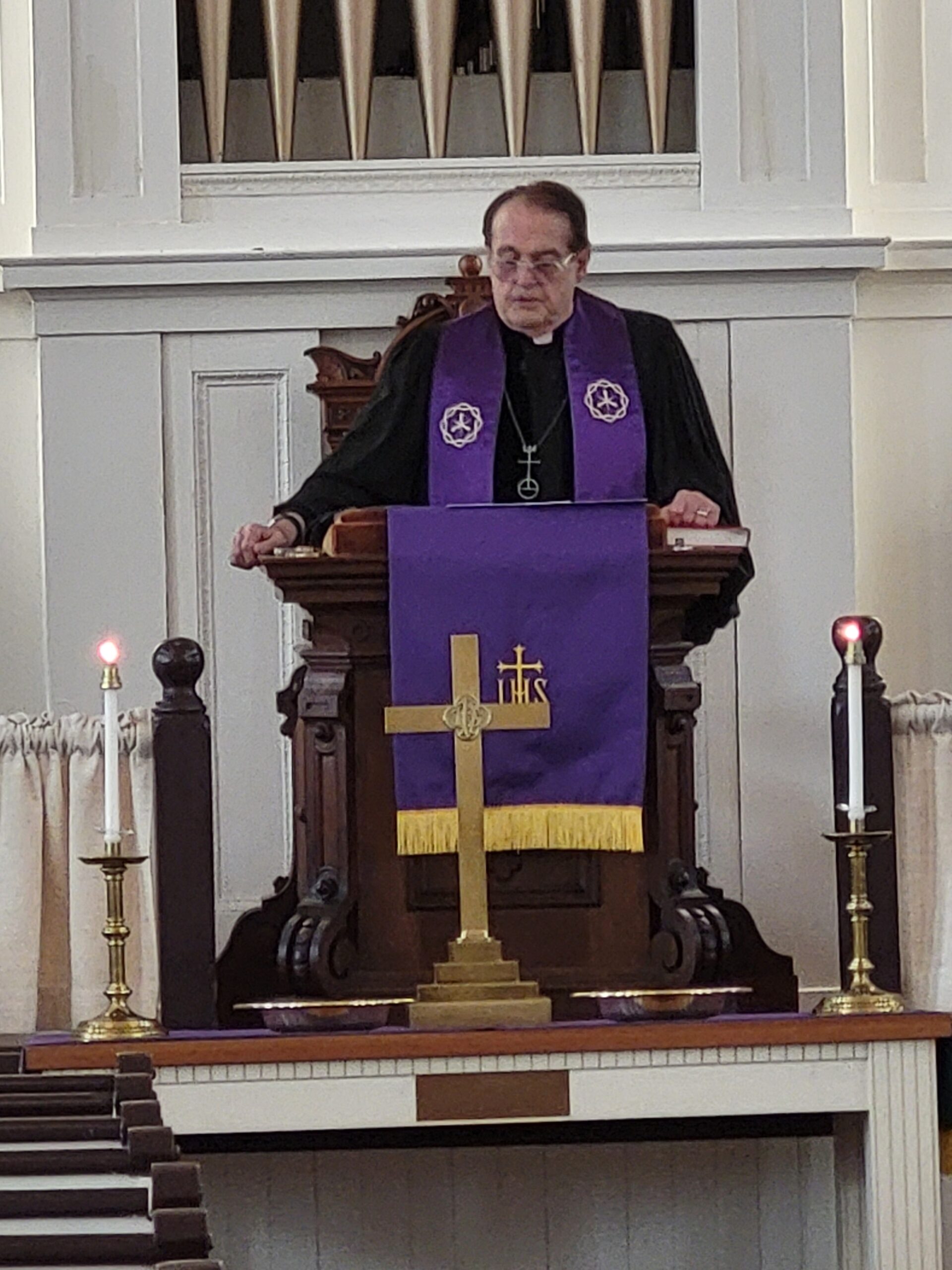Sermon Sunday March 9, 2025
Rev. Norman A. Michaud
“Turning Point in the Wilderness
Luke 4: 1-13
Solitude can nurture but can also terrify us. The wilderness can be a frightening landscape that whispers from the shadows, “You are alone.” In Hebrew, “wilderness” means “the wordless place.” Luke’s Gospel for the first Sunday of Lent is not wordless. Jesus dialogues with the devil, or adversary, who offers him wealth and power so that he may rule the material world.
Last Sunday, in Luke 9, Jesus changed or transfigured on a mountaintop. Peter, James, and John witnessed Jesus become ignited and surrounded by light. Ancient Hebrew prophets Moses and Elijah sat with him. God’s voice commanded the disciples to “Listen to Him!”
This first Sunday of Lent, we suddenly find ourselves back at the beginning of Jesus’ mission. Those who composed the Lectionary expected Christians to know that the reading comes right after Jesus’ baptism. When flashbacks happen in the Lectionary sequence, I find such reversals in contextual time challenging. I want to know why this happens and why this change in the order of the story is chosen. I decided to read Luke 3 so that I could recall the events described by Luke in sequence.
Jesus’ temptation in the wilderness is familiar to us. The details vary a bit between Matthew and Luke, and Mark’s account is brief, but the theme and events are repeated in Lectionary years A, B, and C.
Luke 3 introduces John the Baptist, Jesus’ cousin, son of Martha. John quotes the prophet Isaiah 3:4
“The voice of one crying out in the wilderness:
‘Prepare the way of the Lord;
make his paths straight.
5 Every valley shall be filled,
and every mountain and hill shall be made low,
and the crooked shall be made straight,
and the rough ways made smooth,
6 and all flesh shall see the salvation of God.’
John’s opening declaration then brings us to Luke 3:21 where John baptizes Jesus and we hear the voice of God:
4: 21 Now when all the people were baptized and when Jesus also had been baptized and was praying, the heaven was opened, 22 and the Holy Spirit descended upon him in bodily form like a dove. And a voice came from heaven, “You are my Son, my Beloved; with you I am well pleased.”
In Luke 4, still dripping with Jordan’s water from his baptism, Jesus heads to the wilderness and finds himself tempted by the devil, or adversary, for 40 days. The number 40 always has significance in the Bible.
After the Transfiguration illuminates Jesus in Luke 9 a new period of 40 days, the Season of Lent, begins. Jesus knows what is to come at the end of this Lenten Season; his arrest, torture, humiliation, and execution will happen. He is tempted again, this time to remove the cup of his blood, his life, be removed from him. Jesus prays in Luke 39:42 “”Father, if you are willing, remove this cup from me, yet not my will but yours be done.” 43 Then an angel from heaven appeared to him and gave him strength.”
There’s comfort in familiarity, isn’t there? Temptation comes in 40-day sequences. Noah knew the 40-day flood. We know that Jesus overcomes the temptations that the devil, or adversary, sets before him in the wilderness. But Jesus now finds himself at the end of Passover, where the crowds of Jerusalem cheer him on and become a loud wilderness of the Spirit. Those who cheered him for his triumphant entry into the Holy City will soon jeer at his condemnation by Pilot and line the streets, exhorting his path to the place of his execution, Golgotha.
We do not embark on this journey to live, trust, and have faith without the assurance that the Spirit leads us: we do not go alone. We remember and acknowledge the wilderness of our journey—a wild place of questions, fears, doubts, and temptations. This wilderness is part of our story but not the end. We have the voice that speaks in the wilderness, Christ shouting down the tempter and assuring us we are not alone. We have the promises that respond to our wilderness wanderings—the assurance of God’s grace, the gift of worship and living bread from Christ, the communion of saints and the forgiveness of sins, the celebration of all the good things God has given us.
Our central commandment is to love. Love is our covenant. We praise God, His Beloved, and the Holy Spirit in prayer. In prayer, we ask for wisdom and turn from our self-centered ways. We pray to be delivered from debts or temptations. In actions, we give what we can, whether time, acts of kindness, or cash. In the United Church of Christ, we have a tradition and evangelize by what we do and our positions on social action. We do not demand that others are excluded because they are not members – they are neighbors.
The temptations of the earth are revealed to us and show the broken way that will pass once one chooses to follow Christ, the Messiah, who has taught us how to reject the actions of an unjust society. To be “righteous” is to live through justice. Jesus expanded the law of Moses to our thoughts beyond our behavior. In 1979, the Nobel Laureate poet Bob Dylan entered his “Christian Phase” with his album, “Slow Train Coming.” One of the songs from that album is “You Gotta Serve Somebody.” Dylan asks us who we serve:
…” But you’re gonna have to serve somebody, yes indeed
You’re gonna have to serve somebody
It may be the devil, or it may be the Lord
But you’re gonna have to serve somebody
Might be a rock ‘n’ roll addict prancing on the stage
Might have money and drugs at your command or children in a cage
You may be a businessman or some high-degree thief
They may call you Doctor or they may call you Chief
But you’re gonna have to serve somebody, yes indeed
You’re gonna have to serve somebody
Well, it may be the devil or it may be the Lord
But you’re gonna have to serve somebody …”
The lyric challenges the listener to choose to serve, as Jesus did. By serving God, we “Worship the Lord, your God, and serve Him Only.”
Have I been tempted in my life? Yes. Have I been delivered from temptation? Yes. Have I lost much and regained much through giving my service to God? Yes. Have I met “the devil?” Yes. Have I made bad choices? Yes. I am human, and as a human, we all meet choices. Through Christ, I am forgiven 7 times 77. If I make a mistake in choices, am I doomed? No! I do my best to turn toward and live the teaching of Jesus as best I can. Anger and a sense of doom will come. But, informed by Christ, though we may falter and fall, we are promised redemption through change, and to change, we amend our ways. We transfigure. We change. And through change, informed by Christ’s teachings, we learn to love abundantly and shun the temptations of anger and death. Through change, we find salvation and eternal life in the Spirit.
May our faithfulness live adorned by the cross within our hearts each day and recognize that through grace, we will share everlasting life through Christ. May our prayers, our sacrifices, and through our giving of our time and talents show the world that we hold Christ’s teachings in our hearts and act on those teachings whenever and wherever we may be.


